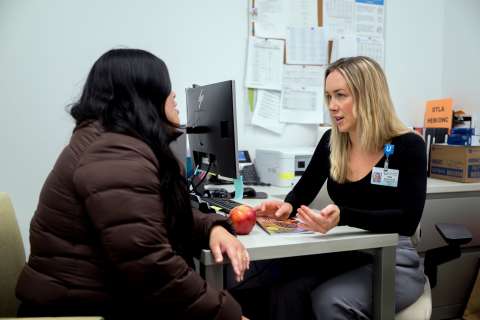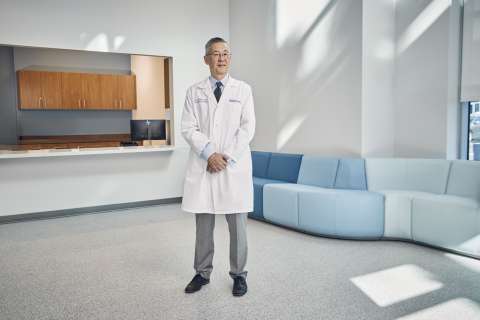After tying the knot in May of 2018, Jeff Goar and his wife, Rachel, were looking forward to growing their family. But just weeks after getting married, they learned they would have to put that on hold.
In early June, Goar started to experience immense pain throughout his body that lasted for days. It hurt to sit, stand and lay down. Every position was uncomfortable. In his early 30s at the time, he just figured it was due to working long hours.
He continued to push through the persistent pain, but it became insufferable one night while playing softball with his dad.
“I was in so much pain that I had to bench myself,” said Goar. “And when I got home, I could not sleep and the only way I could get comfortable was to go under hot water in the shower.”
That’s when he decided to go the emergency room.
At first, the doctors thought the pain might be a gastrointestinal issue. But Goar knew it was something more serious. After some additional testing and scans they ended up finding a huge mass in his abdomen. He was then told he was going to be admitted to the oncology ward.
At this point, Goar was relieved that he had an answer. “It was like, finally, you guys believe me.”
Later that night Goar and his wife were introduced to UCLA Health oncologist Deborah Wong, MD, PhD.
Nationally recognized cancer care
Dr. Wong, associate clinical professor of medicine in the division of hematology-oncology at the David Geffen School of Medicine at UCLA and investigator at the UCLA Health Jonsson Comprehensive Cancer Center, is part of a renowned team of physicians and scientists developing new cancer therapies and providing the best in experimental and traditional treatments.
An estimated 100,000 new cases of melanoma will be diagnosed in the U.S. this year.
Learn more Skin Cancer Services and Clinical Trials at UCLA Health
Dr. Wong let Goar know that his pain was actually a symptom of metastatic melanoma, a rare but deadly form of skin cancer.
While melanoma accounts for only about 1% of all skin cancer cases, rates of melanoma have been steadily increasing over the past few decades and it is responsible for the vast majority of skin cancer deaths, according to the American Cancer Society. An estimated 100,000 new cases of melanoma will be diagnosed in the U.S. in 2024, and more than 8,000 Americans will die from the disease this year.
This wasn’t Goar’s first bout with cancer. He was diagnosed with melanoma in his early 20s and had it surgically removed. But this time, the melanoma came back in a more aggressive form and had already spread to other parts of his body.
“It’s hard to imagine going from celebrating the beginning of a marriage to getting a metastatic melanoma diagnosis,” said Goar. “It was obviously upsetting for both me and my wife.”
From diagnosis to immunotherapy clinical trial
While discussing his treatment options with Dr. Wong, Goar learned about a new clinical trial that was evaluating an investigational cancer vaccine, called NEO-PV-01, that is given in combination with nivolumab, an immune checkpoint inhibitor, another type of immunotherapy drug.
The vaccine is personalized for each patient based on the specific characteristics and mutations of their tumor. It’s designed to stimulate the patient’s immune system, particularly T cells, to recognize and attack cancer cells. Adding in an immune checkpoint inhibitor, such as nivolumab, can help activate the immune system, making it more effective at attacking cancer cells.
“This personalized method holds promise for increasing the precision and effectiveness of cancer treatment and providing long-lasting immunity against melanoma,” said Dr. Wong.
Goar and his wife were hoping to start a family, so after hearing about his options he wanted Dr. Wong to give it to him straight.
“I asked her, if this doesn’t work, what am I looking at? And she told me without an effective treatment, I would have about six months to a year. So, I thought, what do I have to lose?”
Two months later, Goar started the clinical trial.
Promising results
In late 2020, after nearly 2 1/2 years on the treatment, during which Goar continued to work full time overseeing industrial refrigeration services, he completed the therapy and was ready to start a family.
His scans still show several measurable masses, but the treatment was able to shrink the masses to a point where they no longer cause Goar any discomfort or pain. He regularly goes in for routine CT scans, which have continued to show no additional growth for the past four years.
While the vaccine is not yet approved by the U.S. Food and Drug Administration, the results of the first phase of the study, published in the journal Cell, have shown it is feasible and safe for patients with advanced melanoma, non-small cell lung cancer and bladder cancer. Researchers also found the combination of the immunotherapy treatments successfully activates the immune system, particularly T cells, which continue to respond to the specific neoantigens over a long period, leading to the destruction of cancer cells by the immune system.
“Overall, the vaccine has encouraging outcomes,” said Dr. Wong. “Jeff’s case is a testament to the incredible potential of immunotherapy, transforming what was once an incurable disease into a treatable condition.”
Celebrating first birthday, first Father’s Day

On June 21, 2023, Jeff and Rachel Goar welcomed a baby girl into their family. They will now be celebrating her first birthday just days after Goar’s first Father’s Day.
“Dr. Wong has enabled me to continue living and gave me the opportunity to have a family with my wife,” said Goar. “If she didn’t get me in that clinical trial, I wouldn’t still be above dirt right now.”




